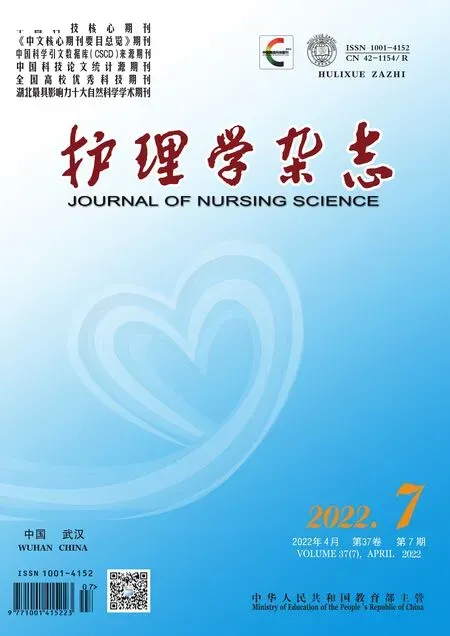Human caring for patients suffering from major infectious disease-nurses′ entire use of self
2022-01-01LiuYilanHeJiaoZhangFengjianWangShuangHuDeyingJeanWatson
Liu Yilan,He Jiao,Zhang Fengjian,Wang Shuang, Hu Deying,Jean Watson
Abstract: Human caring is regarded as the essence and core of nursing.Based on Dr. Watson′s human caring science theory, nursing staff in Wuhan Union Hospital and other healthcare institutions have delivered warm human caring service in patients′ daily care.During the outbreak of major infectious disease-pandemic of COVID-19, patients are suffering from great psychological distress and pressure.Like nursing professionals around the world, nurses in Wuhan, Hubei, China, along with the colleagues from the National Aid Medical Team, used entire of themselves to conduct diversity human caring measures to patients suffering from the major infectious disease with love and responsibilities, which greatly demonstrated the essence and value of nursing care, and has wide implications for further development of nursing.
Key words: human caring; major infectious disease; nursing; COVID-19; caring relationship
中图分类号:R47;R197.323文献标识码:ADOI:10.3870/j.issn.1001-4152.2022.07.095
Authors′ Affiliations:1.Department of Nursing,Union Hospital of Tongji Medical College, Huazhong University of Science and Technology, Wuhan 430022,China;2.Department of Pediatric,Union Hospital of Tongji Medical College, Huazhong University of Science and Technology;3.Watson Caring Science Institute,Boulder, Colorado 80304,USA
Liu Yilan:female,PhD,professor of nursing,director of the nursing department
Corresponding to:Jean Watson,jean@watsoncaringscience.org
submitted:2021-11-06;revised:2021-12-27
The pandemic of COVID-19, the worst global infectious disease plague in the past hundred years, has posed a threat to safety, health and survival of all humankind[1]. Besides physical discomfort, patients also reported and displayed emotional problems such as fear, anxiety, depression and more, even after hospitalization, because of isolation from the outside world and lack of family support[2].Thus, care givers faced unheard of challenges and an historic mission in the COVID-19 pandemic.
Nevertheless, since the origin of modern nur-sing from Nightingale onward, nursing has sustained the spirit of humanity, dedication, innovation and care of mind/body/spirit as a calling. Symbolic of the time, the British government named the improvised COVID-19 Square Cabin Hospital, the Nightingale Hospital. Still at this time, medical and nursing staff around the world are bravely fighting this pandemic with devotion, amidst threats and danger every day.
In spite of this unimagined and unplanned situation with life threats to patients, caregivers, and global health, the nursing staff at hospitals in Wuhan, Hubei rose to the occasion with devoted commitment, from the beginning to the end of the pandemic.Additionally, 28,600 nurses rushed to Wuhan and Hubei under the call of the government, to help patients and staff in the comprehensive treatment and care of COVID-19 patients.
While nurses worldwide offered similar perso-nalized, patient care practices, nurses in hospitals in Wuhan, taking Wuhan Union Hospital as example, were guided by the Philosophy and Theory of Human Caring.Examples of micro-caring practices, guided by the theory, include, but are not limited to the following:
·Nurses contacted patient′s family for video visits.
·Nurses accompanied frightened patients by staying at their bedside.
·Nurses spontaneously offered and brought on their own, items such as fruit, clothes, shoes and other such supplies; personal offerings of support to patients in need.
·Birthday cakes were brought in to celebrate patient′s birthday.
·Nurses used loving kindness language to encou-rage, help and comfort patients.
·Body language such as ‘loving heart-centered compassionate presence’ and non-verbal communication were used to repattern the field of anxiety and fear to one of calmness and serenity.
·Directors of nursing, demonstrated leadership by going to the bedside of patients and nurses in the front line, talking with them, touching them, preparing them, providing confidence and hope.
·Nursing staff engaged in full use of self and unique gifts and talents to authentically connect with the patients- for example, alleviating tension by sin-ging, dancing, painting of the wall of the wards in order to make up for the distancing of the Personal Protective Equipment (PPE) and heavy protective clothing.
·Further, outside medical team nurses took the initiative to learn Wuhan dialect to better communicate with patients in dialect, surprised and pleased the patients unexpectedly.
Overall, these and many other creative, artistic, and imaginative micro- and macro-human caring nursing practices paint a beautiful picture and tapestry of loving-kindness and compassionate caring.This is very touching, but not surprising.With the strong base of Chinese traditional culture, i.e., the benevolence of medicine, combined with internatio-nal clinical scholarship of caring science and theory, the staff were more intentional and professional in their comprehensive approach to such a crisis of caring.As context for these micro-caring examples, Wuhan Union Hospital, for the past several years, has been developing its theory of human caring.Recent years,under the guidance and assistance of Dr. Watson and Watson Caring Science Institute[3], the nursing leaders have developed systems in implementing human caring to patients[4].The human caring practice of the hospital as well as other hospitals in China is advancing and communicating with others in the international world, with mutual benefits and influence.
As a result of this history and background in caring science, the major infectious disease-COVID-19 ushered in a new chapter in the implementation of humanistic caring theory to practice in midst of most dramatic threat to humanity.The nurses caring story took place on the battlefield in Wuhan as a testimony of patients receiving the finest of human caring to promote healing, harmonious, physical and spiritual comfort and recovery. Moreover, this professional practice contributed to nurses′ well-being, benefitting the caregivers themselves. The government of China affirmed the nurses through various forms of praise and recognition[5].Nurses′ sense of professional value and pride has been restoring to their soul and spirits during this world-wide challenge to patient care.
These human caring practices continue to have far-reaching significance and impact on COVID-19 patients and families.Nurses′ comprehensive practices of human caring have enriched the theoretical knowledge system of staff and have helped to promote the development of human caring nursing throughout China[6-7]. It can serve as an exemplar and reference for future nursing leadership in caring education, clinical practice and managements around the world.
